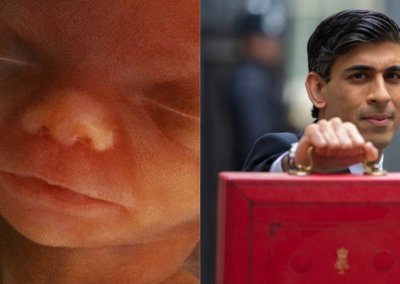Conception statistics released by the Office of National Statistics show that nearly a quarter of pregnancies among English and Welsh residents ended in abortion in 2018 – the highest proportion since records began in 1990.
The figures show that, in 2018, there were 839,043 conceptions for English and Welsh residents and 200,608 abortions.
24% of pregnancies resulted in abortion, in 2018, up from 22.7% a year earlier and the fifth year in a row they have risen. It means that for almost every three babies born, one is aborted.
For the first time since 2013, the percentage of conceptions leading to a legal abortion increased for every age group, with the highest increase (1.8%) recorded among women aged 20 to 24 years.
The percentage of conceptions leading to abortion increased in all regions over the last decade.
In 2018, the highest proportion could be found in London at 27.1%, whilst the South West had the lowest at 21.6%.
The alarming figures come as the UK Government faces a number of legal challenges surrounding its law on abortion.
A 24-year-old woman who has Down’s syndrome has launched a landmark case against the UK Government over the current discriminatory abortion law that singles out babies with disabilities allowing terminations right through to birth for conditions including Down’s syndrome, cleft lip and club foot.
Additionally, the Northern Ireland Secretary faces being dragged through the courts over the controversial abortion framework due to come into force ahead of 31 March 2020.
The threat of a legal challenge is outlined in a pre-action notice sent recently by lawyers acting on behalf of Right To Life UK to Northern Ireland Secretary of State, Brandon Lewis MP. The pre-action notice warns that the organisation will be taking legal action against the Government if the final abortion framework introduced to Northern Ireland goes further than what they are legally required to introduce.
The Government are legally required, by the Northern Ireland (Executive Formation etc) Act 2019, to introduce a limited abortion framework in the province ahead of 31 March 2020.
However, since then, the Government has launched a consultation on a proposed abortion framework for Northern Ireland which goes far beyond the limited changes strictly necessary for the Government to comply with the Northern Ireland (Executive Formation etc) Act 2019.
The pre-action notice outlines that should the Government proceed to implement the proposals as outlined in the consultation document into the final framework for the provision of abortion services in Northern Ireland, the Government would be acting unlawfully.
The notice outlines that any regulations created to give effect to the Government’s duty under section 9(1) of the Northern Ireland Act would be susceptible to judicial review. The solicitors have outlined that the organisation would have standing to bring forward such proceedings.
Right To Life UK has therefore put the Government on notice that they will seek to challenge, by way of judicial review, any provision which unlawfully seeks to impose abortion on Northern Ireland beyond the legal obligation dictated by the Northern Ireland Act.
A spokesperson for Right to Life UK, Catherine Robinson said:
“It is a national tragedy that almost 1 in 4 conceptions among English and Welsh residents ended in abortion in 2018. This represents the highest proportion since records began in 1990.
Every one of these abortions represents a failure of our society to protect the lives of babies in the womb and a failure to offer full support to women with unplanned pregnancies.
“Questions must be asked about why an increasing proportion of pregnant women are ending their pregnancies via abortion.
“Proposals from abortion campaigners to remove legal restrictions around abortion and introduce abortion up to birth would likely see these numbers get even worse. The only winners in this sad state of affairs are abortion providers who can capitalise on this situation, and perhaps, are even part of the cause of it, insofar as they want ever more abortions to increase their income.
“Polling shows large majorities of women in the UK support changes to our abortion laws that would have a positive impact on lowering the number of abortions. 70% of women want the current time limit on abortion to be lowered and 91% of women want a ban on sex-selective abortion.
“We are calling on the Government to urgently bring forward sensible new restrictions and increased support for women with unplanned pregnancies. This would ensure we were working together as a society to reduce the tragic number of abortions that happen each year.
“This increase in abortions comes as private abortion clinics have been accused by the Care Quality Commission of paying staff bonuses for persuading women to undergo abortions.
“Vulnerable women should not be seen as a revenue opportunity but sadly we know this is not the reality as abortion itself is a multi-million pound industry. Private abortion clinics have a vested monetary interest in increasing the numbers of abortions they perform every year.”











